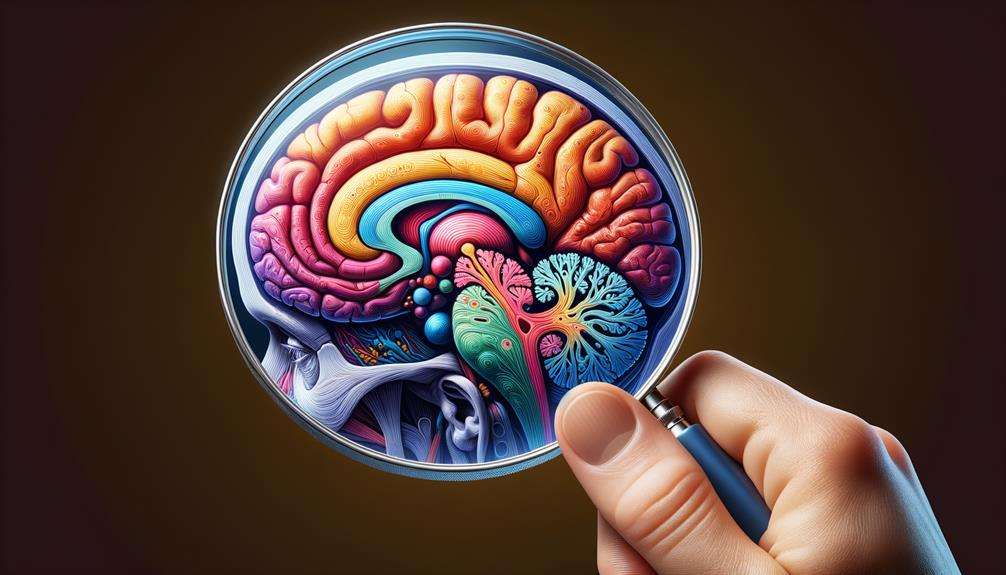Ensuring a well-rounded approach is crucial for living well with Parkinson’s disease. This includes effective medication management, consistent physical therapy, emotional support, and lifestyle adaptations. Considering alternative strategies like CBD oil under professional guidance can also be beneficial. Remember, you’re not alone in this journey. Connecting with support groups can offer necessary connection and understanding. There’s more you can uncover about living fully with Parkinson’s, so continue on this path of discovery.
Understanding Parkinson’s Disease

You might be wondering, ‘What is Parkinson’s Disease?’
It’s a condition that impacts your nervous system, particularly the parts that control movement.
As we explore this topic, we’ll discuss how it starts, progresses, and how it differs from other disorders like Multiple Sclerosis.
What is Parkinson’s Disease
Parkinson’s disease, often referred to as a movement disorder, is a chronic condition that impacts your nervous system, particularly the brain region responsible for controlling movement. It’s a type of neurodegenerative disease, meaning it progressively worsens over time.
The most identifiable symptoms are tremors, stiffness, and slowness of movement. You might notice a slight shaking in a finger that gradually spreads as the disease progresses. Stiffness can occur in any part of your body, making it difficult to move freely. Your movements may also become slower, making everyday tasks time-consuming and challenging.
Understanding these key features can help you manage this condition and maintain a good quality of life.
How Does Parkinson’s Disease Start and Progress?
To comprehend how Parkinson’s disease starts and progresses, it’s crucial to understand the role of dopamine in our brain. Dopamine deficiency in certain areas of the brain is what triggers Parkinson’s. This deficiency leads to balance problems, which are a common symptom of the disease.
The progression of the disease isn’t the same for everyone. Some may experience a slow progression, while others may see rapid changes. Physical therapy exercises can help manage balance issues and improve mobility.
There’s also growing interest in using CBD oil for symptom management. The CBD oil dosage, however, needs to be carefully managed under the supervision of your healthcare provider to ensure safety and efficacy.
Parkinson’s Disease vs. Multiple Sclerosis: Understanding the Differences
While both Parkinson’s disease and Multiple Sclerosis (MS) are neurological disorders, they manifest differently and affect different parts of your nervous system. Parkinson’s disease hampers your motor functions due to a decrease in dopamine-producing neurons.
MS, on the other hand, damages the protective cover of nerve cells in your brain and spinal cord, leading to a variety of symptoms. You might experience fatigue, difficulty in coordination, or issues with your vision.
Researchers are studying cannabinoids for potential benefits in managing symptoms of both disorders. However, it’s important to understand that while Parkinson’s and MS are both neurological disorders, they’re distinct diseases with unique sets of symptoms, causes, and treatment strategies.
Consult your healthcare provider for personalized advice.
Managing Parkinson’s Disease

Managing Parkinson’s Disease is a personalized journey unique to each individual.
You’ll explore various treatment options, learn to handle medication side effects, and possibly consider alternative therapies like cannabis.
Let’s discuss these points further to better manage your condition.
Treatment Options for Parkinson’s Disease
What’re your options when it comes to managing Parkinson’s disease? Several treatment strategies can enhance your quality of life.
- Medication: Levodopa is the most common drug, helping to replenish the brain’s dopamine levels and reduce symptoms.
- Therapies: Both physical and occupational therapy can assist you in maintaining mobility and independence.
- Deep Brain Stimulation (DBS): This surgical procedure can alleviate symptoms when medication isn’t sufficient.
These approaches aim to control symptoms and enhance daily living. However, effectiveness varies among individuals. It’s important to work closely with your healthcare provider to tailor a treatment plan that suits your specific needs. Remember, the goal is to manage your symptoms effectively and maintain a good quality of life.
Medication Side Effects and Management
Managing the side effects of Parkinson’s disease medications can be a vital aspect of your treatment plan. These medications are designed to increase your brain’s dopamine levels, but they can also cause unpleasant symptoms like nausea, seizures, and involuntary movements.
Discuss these medication side effects with your doctor, as they can adjust your dosage or suggest alternatives to help manage these issues. While cannabis and Parkinson’s research is ongoing, you might hear about CBD oil as a potential aid in symptom management.
Exploring Alternative Therapies: Cannabis and Parkinson’s (CBD, Cannabinoids)
While addressing medication side effects is important, you may also be curious about alternative therapies, particularly the use of cannabis and cannabinoids like CBD for the management of Parkinson’s disease symptoms.
- Medical marijuana: Non-psychoactive cannabis, such as CBD, is gaining popularity among Parkinson’s patients. It’s believed to help with tremors, rigidity, and sleep disorders. However, the CBD oil dosage for Parkinson’s tremors varies from person to person, so it’s essential to consult with a healthcare provider.
- Support groups: Sharing your experiences with others can be beneficial. You can gain insights into managing side effects and coping mechanisms from people who are also on this journey.
- Caregiver resources: Providing care for someone with Parkinson’s can be taxing. Thankfully, there are resources available, including guides on administering CBD oil, to help you provide the best care possible.
Exploring the Intersection of Myelin, Phospholipids, and Cannabinoids in MCT Oil
Living a Fulfilling Life with Parkinson’s

Even with Parkinson’s, you can lead a fulfilling life.
From bonding with a loyal canine companion to joining a supportive community, there are many ways to enrich your journey.
Let’s explore how these elements can positively impact your life with Parkinson’s.
Canine Companions: Can Dogs Help People with Parkinson’s?
You might wonder, can a furry four-legged friend really help manage Parkinson’s symptoms? The answer is a resounding yes. Canine companions can be a great addition to your Parkinson’s support groups.
- Service Dogs: Trained to assist with mobility issues, they can help you navigate life with Parkinson’s. They’re able to detect and respond to seizures, providing an added layer of safety.
- Emotional Support: Dogs offer unconditional love and companionship, boosting dopamine levels, the ‘feel-good’ chemical in your brain that Parkinson’s tends to deplete.
- Health Routine: Regular walks and care for your pup can promote physical activity and structure in your day.
The Importance of Support Groups for Parkinson’s Patients
Starting on the journey of Parkinson’s disease shouldn’t be a solitary venture; joining a support group can make a significant difference in your well-being. Living with a chronic illness can often lead to feelings of isolation. Support groups can ease this solitude, offering a sense of connection and understanding shared by those on a similar path.
These groups provide a platform where experiences, struggles, and victories are shared and understood, fostering a positive environment. You’ll find comfort in knowing you’re not alone and gain valuable insights from others’ experiences. Don’t underestimate the power of shared understanding – it’s a lifeline in maneuvering through this disease.
Additional Considerations
As we proceed, it’s crucial to take into account some additional factors when managing Parkinson’s.
You must be mindful of potential seizures, grasp the role of dopamine, and delve into the current research on CBD oil for Parkinson’s and dementia.
Let’s examine these considerations now and discuss how they can impact your life with Parkinson’s.
Parkinson’s Disease and Seizures: What You Need to Know
Occasionally, people living with Parkinson’s disease may also experience seizures, and it’s important to understand how to manage this additional challenge. Seizures can be triggered by various factors, including changes in your dopaminergic medications.
- Be aware of the signs: Seizures can manifest as brief lapses in attention, uncontrollable jerking movements, or even loss of consciousness.
- Seek help: Reach out to your healthcare provider if you notice any seizure-like symptoms. They may adjust your medication or provide additional treatments.
- Find support: Joining support groups can help you connect with others experiencing similar challenges.
Research is ongoing into the potential benefits of CBD oil for managing seizures. Always consult your healthcare provider before starting any new treatment.
Discover our comprehensive guide to CBD for epilepsy
The Role of Dopamine in Parkinson’s Disease
Understanding the role of dopamine in your body’s functions is crucial when dealing with Parkinson’s disease. Dopamine, a neurotransmitter, is essential for movement regulation. It’s produced by specific cells in your brain, and when these dopamine-producing cells die off, it results in the symptoms you see in Parkinson’s disease.
The loss of dopamine disrupts your body’s ability to perform smooth, controlled movements and can lead to tremors, stiffness, and balance issues. Since dopamine also plays a role in mood and cognition, its decline can contribute to other non-motor symptoms associated with Parkinson’s, such as depression and cognitive changes.
CBD Oil for Parkinson’s Disease and Dementia: Current Research and Considerations
While we’ve discussed how the loss of dopamine affects Parkinson’s disease, it’s also worth exploring how CBD oil could potentially aid in managing both Parkinson’s and dementia, according to current research.
- Cannabis: Studies suggest that the cannabinoids found in cannabis, particularly CBD oil, could alleviate certain symptoms of Parkinson’s disease, such as tremors, pain, and sleep disturbances.
- CBD Oil: This non-psychoactive component of cannabis has been shown to have neuroprotective properties, which could potentially slow the progression of diseases like Parkinson’s and dementia.
- Research: Current studies are promising, but more research is needed to fully understand the potential benefits and drawbacks of using CBD oil for Parkinson’s and dementia.
Conclusion
So, you’ve reached the end of this journey through understanding Parkinson’s, but remember, it’s not the end of your personal journey.
You’re capable of living a full and rich life with Parkinson’s Disease. Take control, find your support network, and never stop seeking ways to live your best life.
Living a Full Life with Parkinson’s Disease: Taking Control and Finding Support
Embracing a fulfilling life with Parkinson’s disease means taking charge of your health and seeking out supportive communities. It’s important you prioritize:
- Speech Therapy: This can help manage speech and swallowing difficulties often associated with Parkinson’s.
- Mental Health: Regular consultations with a mental health professional can help you cope with the emotional aspects of the disease.
- Sleep Disorders: Address these promptly since good sleep is essential for overall health.
Explore online support groups for Parkinson’s patients, which can offer a wealth of shared experiences and advice. Dietary modifications for Parkinson’s can also be beneficial, so consult a nutritionist about a healthy diet plan.
Frequently Asked Questions
What Is the Life Expectancy for Someone Diagnosed With Parkinsons Disease?
While it’d be great to have a crystal ball to predict life expectancy after a Parkinson’s diagnosis, it’s not that simple. Each person’s journey is unique. Generally, with proper management and care, many individuals lead satisfying, long lives.
However, it’s important you work closely with your healthcare team to manage symptoms effectively. Remember, a diagnosis isn’t a death sentence; it’s a new chapter.
Keep living, keep fighting, and most importantly, keep moving.
Can Diet and Nutrition Have an Impact on Parkinsons Disease Symptoms?
Yes, your diet and nutrition can impact your Parkinson’s disease symptoms. A balanced diet can help manage some symptoms and side effects of medication, like constipation or low blood pressure.
It’s also important to maintain a healthy weight. Specific nutritional needs might vary, so it’s best to consult with a healthcare professional for personalized advice.
Is There a Link Between Parkinsons Disease and Genetics?
Yes, there’s a link between Parkinson’s disease and genetics. Some types of Parkinson’s are due to specific genetic mutations. However, these cases are relatively rare. Most instances of Parkinson’s don’t have a clear genetic cause.
It’s likely a combination of genetic factors and environmental exposures contribute to the disease. If you have a close relative with Parkinson’s, your own risk is slightly higher, but it’s still quite low overall.
What Are the Early Warning Signs of Parkinsons Disease?
You’re asking about early warning signs of Parkinson’s disease.
Common signs include:
- Tremors or shaking
- Small handwriting
- Loss of smell
- Trouble sleeping
- Trouble moving or walking
- Constipation
- A soft or low voice
- A masked face
- Dizziness or fainting
- Stooping or hunching over
It’s important to remember that these symptoms can also be caused by other conditions, so if you’re experiencing them, you should consult with a healthcare professional.
How Is Parkinsons Disease Diagnosed?
Parkinson’s disease is diagnosed through a thorough neurological examination. Your doctor may also note your medical history and symptoms. There’s no definitive test, so it’s often challenging to diagnose.
Sometimes, they’ll prescribe Parkinson’s medications to see if your symptoms improve, aiding in diagnosis.
Always remember, it’s essential to consult with a specialist, such as a neurologist, for accurate diagnosis and effective treatment options.
Discover the source of premium Full Spectrum CBD by visiting Kentucky Cannabis Company, the proud parent company of Bluegrass Hemp Oil.
Conclusion
In life’s dance, Parkinson’s might’ve altered your rhythm, but remember, you’re still in control of the choreography. Embrace your journey’s unique tempo, explore new treatments, and find solace in your support circle. Remember, it’s not just about managing symptoms, it’s about living vibrantly.
So here’s to you: a resilient warrior, traversing the tides of Parkinson’s with grace and determination. Keep dancing to your beat.
At Kentucky Cannabis Company and Bluegrass Hemp Oil, we’re here to help you every step of the way.

